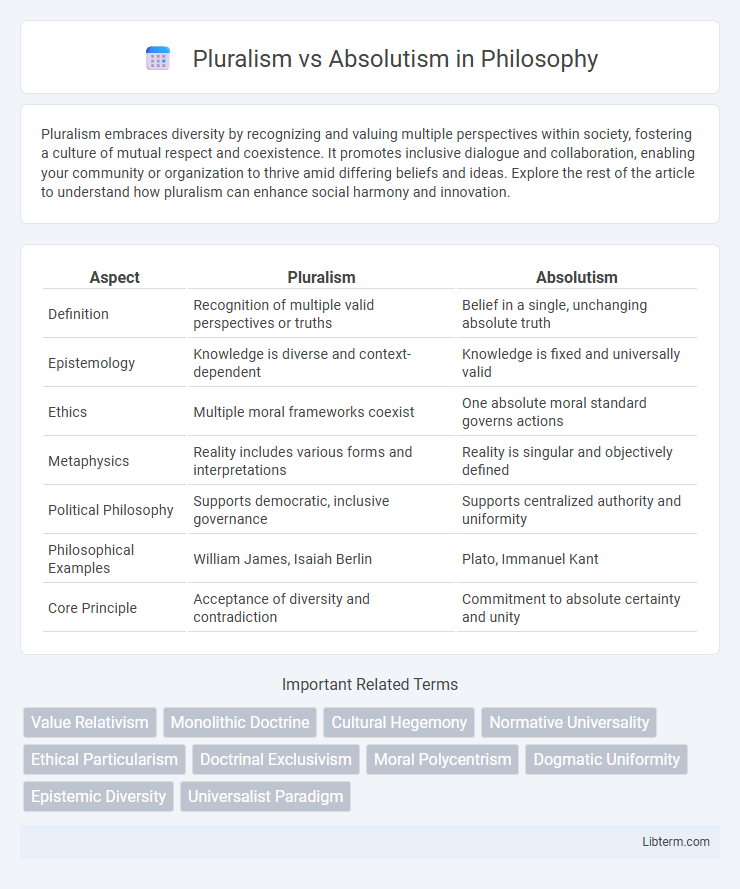Pluralism embraces diversity by recognizing and valuing multiple perspectives within society, fostering a culture of mutual respect and coexistence. It promotes inclusive dialogue and collaboration, enabling your community or organization to thrive amid differing beliefs and ideas. Explore the rest of the article to understand how pluralism can enhance social harmony and innovation.
Table of Comparison
| Aspect | Pluralism | Absolutism |
|---|---|---|
| Definition | Recognition of multiple valid perspectives or truths | Belief in a single, unchanging absolute truth |
| Epistemology | Knowledge is diverse and context-dependent | Knowledge is fixed and universally valid |
| Ethics | Multiple moral frameworks coexist | One absolute moral standard governs actions |
| Metaphysics | Reality includes various forms and interpretations | Reality is singular and objectively defined |
| Political Philosophy | Supports democratic, inclusive governance | Supports centralized authority and uniformity |
| Philosophical Examples | William James, Isaiah Berlin | Plato, Immanuel Kant |
| Core Principle | Acceptance of diversity and contradiction | Commitment to absolute certainty and unity |
Understanding Pluralism: Core Principles
Pluralism emphasizes the recognition and coexistence of multiple perspectives, values, and truths within a society, advocating for tolerance and open dialogue among diverse groups. It rejects the notion of a single, absolute truth, promoting instead the idea that knowledge and moral standards are context-dependent and can vary across different cultures and communities. Core principles of pluralism include mutual respect, inclusivity, and the acceptance of diversity as essential for social harmony and democratic governance.
Absolutism Defined: Key Concepts
Absolutism is a political doctrine where a single authority holds supreme power, often embodied in a monarch whose decisions are final and unquestionable. Central to absolutism is the belief in centralized control, divine right legitimacy, and the absence of legal or institutional checks on the ruler's power. This concept contrasts sharply with pluralism, which emphasizes distributed power and multiple sources of authority.
Historical Origins of Pluralism and Absolutism
Pluralism emerged during the Enlightenment as a response to the rigid structures of Absolutism, which dominated European monarchies from the 16th to 18th centuries. Absolutism centralized power in the hands of a single ruler, such as Louis XIV of France, emphasizing absolute sovereignty and divine right. In contrast, pluralism's historical roots lie in the recognition of multiple authorities and social groups, promoting power dispersion and acknowledging diverse political, religious, and cultural interests.
Major Philosophical Foundations
Pluralism embraces the coexistence of diverse values, perspectives, and truths, grounded in the philosophy of relativism and the belief that reality is multifaceted and context-dependent. Absolutism asserts fixed, universal truths and moral principles rooted in metaphysical realism and deontological ethics, emphasizing certainty and objective standards. Key thinkers in pluralism include William James and Isaiah Berlin, while absolutism draws on Immanuel Kant and Plato for its foundational doctrines.
Political Systems: Pluralism vs Absolutism
Pluralism in political systems promotes multiple centers of power, allowing diverse groups to influence government decisions, fostering democracy and preventing authoritarian rule. Absolutism centralizes authority in a single ruler or ruling body, often limiting political freedoms and concentrating control over laws and governance. The contrast between pluralism and absolutism highlights the ongoing tension between inclusive governance and centralized power in shaping political structures.
Social Impacts of Pluralist and Absolutist Approaches
Pluralism fosters social diversity and inclusivity by encouraging multiple groups to coexist and participate in decision-making, which often leads to greater social cohesion and innovation. Absolutism, by centralizing power and limiting dissent, can create social rigidity and suppress minority voices, potentially leading to social unrest and alienation. The social impact of pluralist approaches generally promotes democratic engagement and tolerance, while absolutist approaches risk fostering inequality and social fragmentation.
Religious Perspectives: Pluralism and Absolutism
Religious pluralism recognizes the coexistence of multiple faiths and promotes mutual respect and dialogue among diverse religious traditions, emphasizing the validity of various spiritual paths. Absolutism in religion asserts the exclusive truth of a single doctrine, often rejecting alternative beliefs and insisting on strict adherence to one authoritative set of teachings. The tension between pluralism and absolutism shapes interfaith relations, influencing social cohesion, tolerance, and conflict in multicultural societies.
Pluralism and Absolutism in Modern Governance
Pluralism in modern governance advocates for diverse interest groups having influence over political decisions, promoting power distribution and preventing authoritarian control. Absolutism emphasizes centralized authority, where a single ruler or governing body holds supreme power, often limiting public participation and dissent. The balance between pluralism and absolutism impacts policy-making, civil liberties, and the stability of political systems worldwide.
Criticisms and Challenges of Each System
Pluralism faces criticism for potentially leading to fragmented societies where competing interests hinder cohesive policy-making and create gridlock. Absolutism is challenged by its tendency to suppress dissent and limit individual freedoms, often resulting in authoritarianism and a lack of accountability. Both systems struggle to balance power distribution and inclusivity, raising concerns about governance effectiveness and social equity.
Future Trends: Pluralism or Absolutism?
Future trends in governance increasingly favor pluralism, driven by global interconnectedness and the rise of diverse stakeholder participation in decision-making processes. Advances in technology and communication empower multiple perspectives, promoting collaborative and adaptive policy frameworks over rigid absolutist structures. However, certain geopolitical tensions and security challenges may sustain pockets of absolutism, requiring a nuanced balance between flexible pluralism and authoritative control.
Pluralism Infographic

 libterm.com
libterm.com